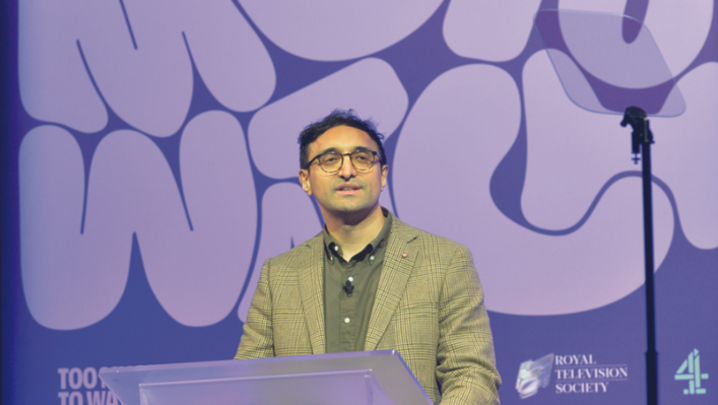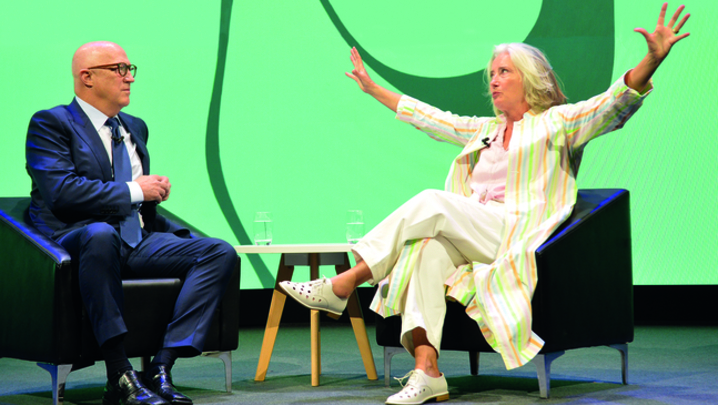Jeff Shell, the new CEO of NBCUniversal, is known for his innate smartness and willingness to work harder than his colleagues. Leo Barraclough reports
When Jeff Shell, 54, kicked off his tenure as Chief Executive of NBCUniversal last month, the avid sports fan was faced with a field of play containing many fast-moving players. This is unlikely to faze the one-time high-school basketball player, who has spent his career out-weaving and out-jumping rivals.
“I want to be in a business that needs fixing or is transitioning,” Shell told the Los Angeles Times when he was Chair of the Universal Filmed Entertainment Group.
“He’s wicked smart and he’s quicker on the curve than anyone I have ever met,” sports executive Tim Leiweke said of his close friend Shell.
A Los Angeles native and a product of the city’s public education system, Shell is the oldest of four children born to a cardiologist father and a teacher-therapist mother.
After studying economics and applied mathematics at Berkeley, he got his MBA at Harvard, before kicking off his career at investment bank Salomon Brothers and in strategic planning for Disney.
Shell held several positions at News Corporation, including President of Fox Cable Networks Group, subsequently becoming CEO of Gemstar TV Guide International.
After joining Philadelphia-based cable giant Comcast in 2004, he ran a host of its channels, including E! and its sports networks. When Comcast purchased NBCU in 2011, he was dispatched to London to manage the international business.
Two years later, he became head of Universal, despite his lack of movie biz experience – or perhaps because of it: Comcast was said to have wanted a Hollywood outsider, albeit one of the corporation’s most trusted lieutenants, to shake up the film division.
Taking Universal movie properties such as Despicable Me and Fast and Furious, Shell focused on building them into lucrative franchises. Key to this was creating ancillary revenue from consumer products and harnessing the promotional power of the wider Comcast group to supersize them into global brands. This strategy was known internally as Symphony.
Shell is a no-nonsense executive with a ready grasp of complex business details; he’s also been praised for being thoughtful and capable of acts of kindness. He shouldn’t be seen as a softy, though.
He is admired for his ability to be decisive when adapting to new circumstances. Within weeks of NBCU buying DreamWorks Animation, home of Shrek, in 2016, Shell announced that some 200 jobs would go at the animation studio as it was rapidly integrated into its new parent operations.
Last year, he merged NBCU’s international and US film and TV operations, which coincided with news that Kevin MacLellan, the Chair of NBCU’s global distribution and international operations, was exiting the company after nearly two decades.
Shell seems custom-made for such uncertain times. The challenges that the TV business faces now in some ways resemble the state of the movie business when Shell took over Universal. It is a world he described as “scary and changing, and, if you just stay where you are, you going to die eventually”.
Chris Meledandri, the producer of Universal hits such as Despicable Me, Sing and The Secret Life of Pets, has said of Shell: “One of Jeff’s secret powers [is…] either he has no fear or he can compartmentalise his fear in a way that I have never seen before, which is critical because, to me, the challenge of the film industry remaining creative comes down to managing our own fear.”
Shell has demonstrated his willingness to challenge existing ecosystems. When he was in charge of the Universal movie business, he signalled his openness to a narrowing of the theatrical window for films, a move that risked antagonising cinema chain owners.
Steve Burke, Shell’s former boss at NBCU, who now chairs the group, has praised him for his humility and ability as a team player. Describing himself as a “business person”, Shell acknowledges that, at the core of the entertainment business, are “art” and “artists”. “The best way to manage a creative business is to be there, to help and support but stay out of the way, and let artists be artists and film-makers be film-makers, and create their magic without any of us business people getting too involved,” he said during a panel on creativity.
At a gala event held in his honour, Shell was asked what the best advice was that he had received as a student was. “To outwork everybody – smarts are important but the hard work gets you further than your intelligence,” he replied. He ascribed his success to being “lucky and having good people around me... I don’t think I’m that smart.”
He admitted to being “too direct” in his dealings with colleagues, which he saw as both his best and worst quality. Shell put this down to his need to be “honest”.
He has interests beyond entertainment. His politics are left of centre – he was a fervent supporter of Barack Obama. Shell and his wife, Laura, last year hosted a fundraiser for Senator Kamala Harris at their home, when she was vying for the Democratic presidential nomination.
Obama nominated Shell to the Broadcasting Board of Governors, now known as the US Agency for Global Media, which operates various state-run media outlets such as Voice of America. This role led to his detention for several hours at Moscow airport in 2016, before being deported to the Netherlands.
Shell even took time recently to come to the rescue, with other white knights, of legendary Beverly Hills eatery Nate ’n Al’s. In sport, he supports the Dodgers baseball team.
One of Shell’s first challenges as NBCU’s new leader is to ensure it competes in the streaming wars; its own platform, Peacock, launches in April. This will be an advertising-supported service, with a free basic tier and a paid-for premium tier, although Comcast subscribers will get this as part of their bundle.
In the US, the company’s ownership of rights to the Tokyo Olympics will help draw the eyeballs that will bring advertisers to Peacock, says Tim Westcott, research director for channels and programming at IHS Markit.
The venture will use the same digital infrastructure that supports Sky’s Now streaming platform in Europe, one example of the many synergies that Shell will look to develop between the two Comcast units.
Among the shows to feature on Peacock will be the US version of The Office, after it ends its run on Netflix in 2021, plus a swathe of NBCU-produced and acquired shows that are being commissioned specifically for the platform.
Co-productions with Sky are also in the works. However, NBCU will continue to license many of its shows to third-party buyers, both in the US and internationally.
Shell’s brief, of course, encompasses far more than Peacock and NBC. Other parts of the empire include Spanish-language network Telemundo, NBCU’s cable networks, such as USA Network, Syfy and Bravo, its film studios Universal and DreamWorks Animation, movie ticketing company Fandango, and the Universal Studios theme parks.
Another challenge for Shell to grapple with is NBCU’s news division, which has been under a cloud following its handling of Ronan Farrow’s reporting on Harvey Weinstein, and Today anchor Matt Lauer’s departure amid an alleged sexual harassment scandal. Another priority is the launch of an international news channel with Sky.
With the Comcast brass cheering him on, and with the support of his colleagues at Sky, Shell is a new giant of the global media arena, albeit a humble one.







